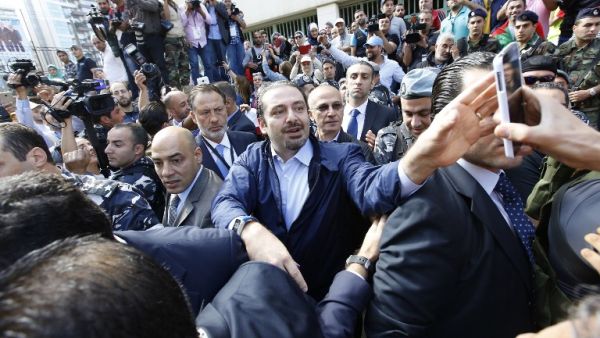The Future Movement-backed electoral list appears to have scored a victory in Beirut’s municipal elections, and was set to sweep all 24 seats of the municipal council and reaffirming former Prime Minister Saad Hariri’s solid power base in the capital, preliminary results showed early Monday.
The sweeping win by Hariri’s “Beirutis’ List” came despite a low voter turnout of only 20 percent, shattering hopes for Beirut Madinati (Beirut My City), a grass-roots secular coalition of academics, artists, technocrats, engineers and activists, to challenge the traditional grip over Beirut’s municipality by the Future Movement and its allies.
Hariri struck an upbeat note about the Beirut election outcome, saying he expected the Beirutis’ List to capture all of the municipal council’s seats. “The results are in our favor, and God willing, tomorrow we will get to work. ... This is for the Beirutis,” Hariri told a group of supporters who gathered outside his Downtown Beirut residence Sunday night, waving the Future Movement’s blue flags and chanting his name.
Hariri thanked them for voting in the municipal elections and took a selfie with them, something he has been known for.
Another fiercely contested election battle was in the eastern city of Zahle, where an electoral list, the Parties’ List, supported by the key Christian parties, the Free Patriotic Movement, the Lebanese Forces and the Kataeb Party, appeared to have won the majority of the city’s 21-member municipal council, dealing a setback to two rival lists, one backed by Myriam Skaff, head of the Popular Bloc, and another supported by Zahle MP Nicolas Fattoush.
Tens of thousands of voters from Beirut, the Bekaa and Baalbek-Hermel lined up at polling stations Sunday morning to cast their ballots in local elections, the first polls to be held in six years. The municipal and mukhtar elections in Beirut and the Bekaa Valley are the first of a four-stage voting. Polls for the remaining governorates are scheduled for May 15, 22 and 29.
Army troops, backed by armored vehicles, and security forces heavily fanned out outside schools and other locations transformed into polling stations to ensure order.
Interior Minister Nouhad Machnouk had announced that 20,000 security and military personnel would be deployed in Beirut and the Bekaa region to ensure safe and smooth elections. After touring polling stations in the Bekaa region, Machnouk described the security situation as “excellent.”
Polling stations opened at 7 a.m. and closed 12 hours later. The voter turnout reached 20.14 percent in Beirut, 52.6 percent in Zahle, 43.5 percent in Rashaya, 42 percent in West Bekaa, 62 percent in Baalbek, and 45 percent in Hermel, according to an Interior Ministry statement.
With its victory, the lineup, made up of 12 Muslim candidates and 12 Christian candidates, Hariri has achieved his declared goal of consecrating equal power sharing between Muslims and Christians, in addition to bolstering sectarian coexistence and national unity.
During the campaign in the past few weeks, Hariri had urged his supporters to show their commitment to parity between Muslims and Christians by voting for the Beirutis’ List.
The list, which had the support of the key Christian and Muslim parties, the LF, the FPM, the Kataeb Party, the Amal Movement and the Progressive Socialist Party, faced competition mainly from Beirut Madinati.
Machnouk praised the generally peaceful election, saying that the voting has proved that the Lebanese are worthy of freedom and democracy.
“The first stage of elections went on smoothly and peacefully at a very high rate and they were held on time. The Lebanese have proved that they deserve freedom and democracy,” Machnouk told a news conference at his office shortly after polls closed at 7 p.m.
“Politics in Lebanon has regained some of its vitality and taken an additional dose,” he said.
Machnouk announced that the ministry received 650 complaints altogether, most of which he said were dealt with. He reported four incidents of gunfire, eight scuffles inside polling stations and 20 other “minor security incidents” throughout the day. “What is important is that the elections happened on time ... the bigger celebration will take place when we elect a president,” he said.The Lebanese Army also praised what it called the “free and democratic” municipal elections in Beirut, the Bekaa and Hermel-Baalbek districts.
“The Army Command points out that there were no security incidents during the elections, except some limited problems in a number of areas, where Army troops, in coordination with security forces, worked immediately to contain them. The elections were held in a climate of responsibility, freedom and democracy,” the Army said in a statement Sunday night.
“The Army Command calls on everyone to respect the results of the electoral process whatever they are and to deal with them in a democratic and civilized manner,” it said.
While urging citizens to refrain from shooting in a show of joy or in rejection of the election results, the Army warned against any action to undermine security, saying perpetrators would be arrested and handed over to the relevant judiciary.
The Interior Ministry said that the 476,021 eligible voters in Beirut were distributed among 1,646 polling stations in the capital, while 308,717 voters in the Bekaa were distributed among 1,158 stations. The 303,102 voters in the Baalbek and Hermel districts cast their ballots at 1,101 stations.
The Interior Ministry banned the use of motorcycles and scooters on all polling days scheduled for this month.
No major security incidents were recorded during the polls, however, two separate scuffles in Zahle involving supporters of the Popular Bloc, the Lebanese Forces, and those who back the Fattoush list left three people injured. The conflicts involved allegations of vote-buying, and at least one person was arrested for paying voters, according to Machnouk.
Witnesses also reported minor incidents at several polling stations as supporters of different lists engaged in verbal spats over the alleged presence of fake ballot lists, but security forces managed to control the standoffs.
Hariri has in previous days toured many neighborhoods in the capital, primarily in west Beirut where he has a popular base, in a bid to sway voters.
“Today is a democratic day par excellence. People should vote freely and in a democratic manner,” Hariri told reporters after voting at the Shakib Arslan School in Beirut’s Verdun area.
A casually dressed Hariri entered a voting booth behind a curtain to fill out his ballots for the municipal and mukhtar votes before submitting them in a box. “I voted for the Beirutis’ list as it is,” Hariri said.
However, the head of the polling station later said that Hariri’s vote in the mukhtar election was invalid because he placed the ballot inside a box specified for the municipal elections.
“Today is a historic day, and every citizen must practice their right to vote, because regret won’t benefit anyone tomorrow,” Beirut Madinati candidate and actress Nadine Labaki said, as she voiced optimism over the voter turnout. “I think the turnout this year will be greater than in the last elections.”
In Baalbek, a list backed Hezbollah and the Amal Movement won the elections against a list headed by Ghaleb Yaghi.
Also in the border town of Brital, the elections were won by a list backed by Hezbollah and the Amal Movement against a ticket headed by the Tufayli family.
Elections were also held in the restive northeastern border town of Arsal amid a heavy security deployment. About 10,000 people are estimated to be registered to vote in the village.
By Hussein Dakroub and Louay Faour








